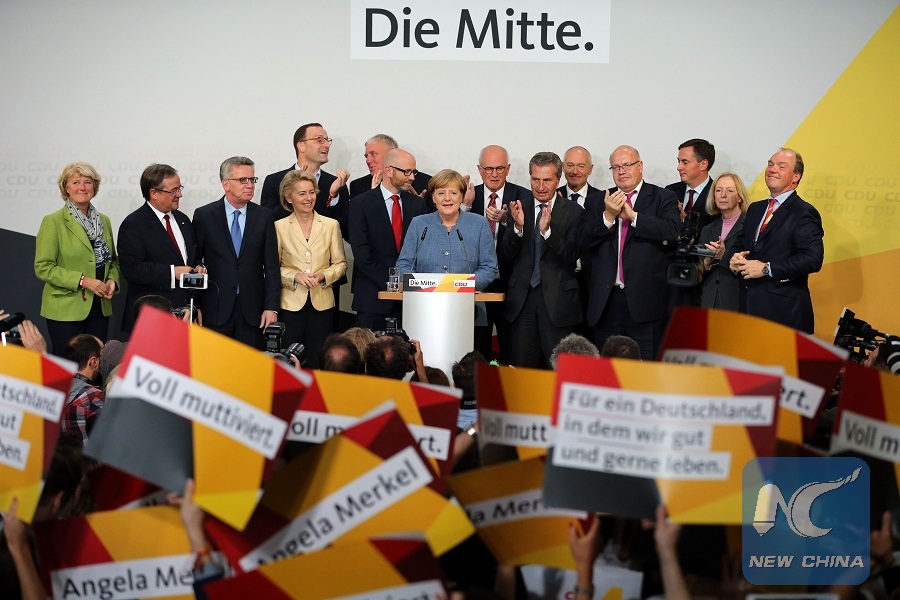
German sitting Chancellor Angela Merkel (C) is applauded after the preliminary exit poll at the Christian Democratic Union (CDU) party's headquarters in Berlin, Germany, on Sept. 24, 2017. (Xinhua/Luo Huanhuan)
ROME, Sept. 26 (Xinhua) -- Germany's election results confirmed a weakening trend for mainstream parties across Europe, an Italian analyst said Monday.
Yet, the expert suggested the refugee issue -- although much debated in the campaign, and a strong point in the German far-right party's rhetoric -- was not the only trigger.
German Chancellor Angela Merkel won her fourth term on Sunday, and her conservative CDU-CSU bloc remained the largest party in parliament, despite scoring the worst result in decades with 33 percent of the vote.
Center-left Social Democrats (SPD) suffered the biggest setback with 20.5 percent of the vote, and said they would now go into opposition.
Far-right party Alternative fuer Deutschland (AfD) made a historic breakthrough with 12.6 percent of the vote, exceeding expectations.
"The good performance of German far-right was somehow expected, considering latest surveys, although may be not to this extent," Antonio Villafranca, head of the European Program with Italy's Institute for International Political Studies (ISPI), told Xinhua.
"It is true the refugee issue -- and the European migration crisis overall -- played a major role in AfD's campaign, but I am not convinced it was the only factor behind the shifting of votes."
"A trend towards the weakening of traditional parties has emerged all across Europe in recent years, showing a malaise for the current orientation of the European Union (EU) on the whole," he explained.
EU's growing attitude towards market liberalization, and the impact of such approach on average households' income, would have also played a role in orienting votes. Germany would provide a perfect example of this phenomenon, according to Villafranca.
He noted the country has a current-account surplus worth about 300 billion euros (356 billion U.S. dollars), or over 8 percent of the gross domestic product (GDP), whereas the same EU rules would suggest the surplus should not exceed 6 percent.
"That means Germany's economy is strongly export-oriented, and, to be competitive, it needs relatively low labor costs," the expert said.
"That is exactly what has happened: the current-account surplus has translated into benefits and savings for companies and the state, but not for many Germans." The expert added that wage growth in Germany has been slowing down in the last two years, increasing slightly above 2 percent only.
"Germans perceive the growth, they recognize it, but many of them do not feel part of it," he stressed. "There are still significant pockets of poverty -- especially in some areas, such as Berlin and the former regions of East Germany -- and that was where the AfD gathered the largest consensus."
Will there be consequences for German politics, and for the country's stance in Europe?
To a certain extent."I think all of the other German forces in parliament will try to isolate the AfD, since this party sees also extremist representatives among its members. Yet, the AfD will count on at least 90 deputies, who would surely make their voice heard," Villafranca said.
Merkel would also likely find herself under pressure from her own party, for allegedly having pushed the CDU-CSU "too much on the left" and leaving a political hole on the right.
For long time, the analyst recalled, Germany's politics has in fact clung on the principle that "nothing should exist at the right side of CDU."
"Now, this has happened and it is traumatic, also psychologically," Villafranca stressed.
As for the EU, a more fractured Germany might weaken the chances of reform. "We have been recently thinking there was a window of opportunity to relaunch the EU and the eurozone, as President of the European Commission Jean-Claude Juncker just said earlier this month," Villafranca said.
"Now, this is not so sure, and it would be wiser to wait and see how Germany's next coalition government would position itself."

